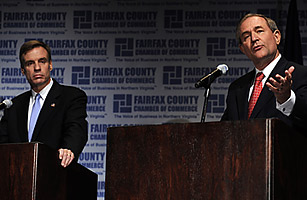
Virginian candidates for U.S. Senate, Democrat Mark Warner, left, and Republican Jim Gilmore, right.
There's a Warner running for the U.S. Senate in Virginia, as there has been for the last three decades. As in years past, this Warner holds a significant money lead, is tall with a square jaw, is a moderate and, for a politician at least, considered quite dashing amongst the ladies-that-take-afternoon-tea set.
But this year the candidate is not the usual Warner, Elizabeth Taylor's ex-husband John Warner, 81, the centrist Republican who is retiring after 30 years in the Senate. This senatorial wannabe is Mark Warner, 53, a popular former Virginia governor, moderate Democrat and no relation of John's. And name recognition is far from being Mark Warner's only advantage in his quest to win John Warner's seat.
As of August, Mark Warner had $5.1 million cash-on-hand compared with his GOP opponent, former governor James Gilmore, 59, who had just $116,000. Four polls out last month showed Warner leading by anywhere from 24 to 33 percentage points, and John Warner even recently hinted he is considering crossing party lines and endorsing the Democrat to inherit his seat. After the younger Warner, a northern Virginia high-tech whiz kid worth an estimated $200 million, challenged the senior senator in 1996, losing 47% to the elder Warner's 52%, the two became friends. "I'm watching that race, following the positions of the two candidates," John Warner told reporters on a conference call. "There are cases where I support Democratic candidates, but I'm not there yet."
John Warner took exception to Gilmore's vehement opposition to the financial bailout bill before Congress, which Gilmore has latched onto as a possible Hail Mary issue that could revive his flagging campaign. "The bailout nationally, the financial crisis, this is the key issue facing the people of this country today and the people of Virginia," Gilmore said in a telephone interview. "I am against the bailout, it was wrong for the taxpayers, wrong for the people of America... Warner was for both bailout bills, including the second one that was loaded up with pork-barrel spending."
Warner rejects Gilmore's criticism out of hand. "People are worried," Warner said in a separate telephone interview. "My opponent has made a career being against things, trying to avoid making hard choices. The bill was far from perfect; I would've loved to have been there making sure the taxpayer got a better deal... But people's lives, their economic lives, are at stake and I think my opponent's position is irresponsible."
The argument is a familiar one between two men that have been bickering about budgets for years. Much of the race between Warner and Gilmore has revolved around their tenures in the governor's mansion that Warner inherited from Gilmore back in 2002. (Both men were limited to one term by the Virginia Constitution.) Warner accuses Gilmore of leaving him a $500 million budget gap that forced some tough decisions. Gilmore counters that Warner not only raised taxes by more than $1.5 billion but that he also supported raising property taxes—measures Warner says were necessary to to protect the state's AAA bond rating.
Warner left office with a balanced ledger, having made the largest investment in K-12 education in the state's history, and an approval rate of 70%. Though he is a less than charismatic speaker, as evidenced by his appearance at the Democratic convention this summer, his moderate profile has served him well in Virginia; he is rated solidly pro-gun by the National Rifle Association and is pro-trade and death penalty. Gilmore, by contrast, is a fiscal and social conservative who proved a bit too strident for the Commonwealth. He passed a 24-hour waiting rule for women seeking an abortion, banned partial birth abortion and human cloning and went to court to try to prevent a family from removing a patient from life support in a case reminiscent of Terry Schiavo. He also shrank all areas of the government except for the education department during his tenure while fighting to reduce car taxes—a controversial move in the face of the downturn in the economy.
While Warner was quick to unite the Democratic Party behind him, Gilmore faced a potential challenge from moderate Rep. Tom Davis, the retiring Congressman who represents Washington D.C.'s Virginia suburbs, as well as from several conservative rivals. The challenges weakened his fundraising and his momentum, especially in the northern Virginia suburbs where Independent swing voters—Virginia has no voter registration by party—have swung toward moderate Democrats in recent years, electing Democrats Warner and his successor Tim Kaine to the governor's mansion and Jim Webb to the U.S. Senate.
"Gilmore's battles over the year with his fellow Republicans seem to have exacted a very heavy toll that has left him uncompetitive in the money chase," says Robert Holsworth, dean of Virginia Commonwealth University's College of Humanities and Science. "Gilmore is an extremely tough campaigner who has picked some good populist issues such as the bailout and offshore drilling to draw contrasts with Warner, but without the financial wherewithal it is almost impossible to compete with Warner in a state where the largest population concentration is in the Washington, D.C., media market."
Gilmore concedes that when it comes to money he's at a disadvantage. "Would I rather have $4 million more? Yeah, then I could make my case on television," Gilmore laments. "But I'm confident that the issues are with us." Unfortunately, few others seem to share his confidence. Virginia's Senate seat is rated the most likely to flip from Red to Blue by all professional congressional watchers from the Cook Political Report to National Journal's Hotline.
(See a gallery of campaign gaffes here.)